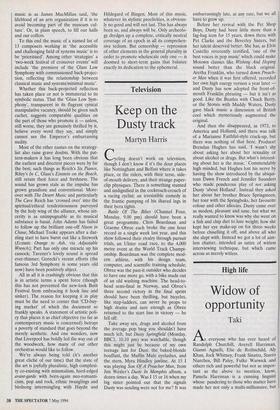Television
Keep on the Dusty track
Martyn Harris
cycling doesn't work on television, though I don't know if it's the dour places like Nottingham and Belfast where it takes place, or the riders, with their terse, side- of-mouth delivery, and their strange paper- clip physiques. There is something stunted and undignified in the cockroach-crouch of a racing cyclist; an irresistible comedy in the frantic pumping of his shaved legs in their lycra tights.
Battle Of The Bikes (Channel Four, Monday, 9.00 pm) should have been a great programme. Chris Boardman and Graeme Obree each broke the one hour record in a single week last year, and this show followed their rivalry through pursuit trials, an Ulster road race, to the 4,000 metre event at the World Track Champi- onship. Boardman was the complete mod- ern athlete, with his design team, computer, and scientific training schedule; Obree was the past-it outsider who decides to have one more go, with a bike made out of an old washing machine. The head-to- head semi-final in Norway, and Obree's three second victory in the final sprint should have been thrilling, but bicycles, like step-ladders, can never be props to high drama and sure enough as Obree returned to the start line in victory — he fell off.
Take away sex, drugs and alcohol from the average pop biog you shouldn't have much left, but Dusty Springfield (Monday, BBC1, 10.10 pm) was watchable, though this might just be because of my own teenage lust for Dust: the baked-blonde bouffant, the Muffin Mule eyelashes, and the stern, Myra Hindley jawline. At 15 I was playing Son Of A Preacher Man, from Jim Wexler's Dusty In Memphis album, a dozen times a day. Was I 15 or 16 when my big sister pointed out that the signals Dusty was sending were not for me? It was embarrassingly late, at any rate, but we all have to grow up.
Before her revival with the Pet Shop Boys, Dusty had been little more than a fag-hag icon for 15 years, down there with Pet Clarke and the Beverley Sisters, but her talent deserved better. She has, as Elvis Costello reverently testified, 'one of the best voices in pop music' which could make Motown classics like Wishing And Hoping sound better than the black original. Aretha Franklin, who turned down Preach- er Man when it was first offered, recorded her own high energy version a year later and Dusty has now adopted the front-of- mouth Franklin phrasing — but it isn't as good. Like the Beatles with Chuck Berry, or the Stones with Muddy Waters, Dusty gave black music a dimension of British cool which mysteriously augmented the original.
And then she disappeared, in 1973, to America and Holland, and there was talk of a Marianne Faithful-style crack-up, but there was nothing of that here. Producer Brendan Hughes has said, 'I wasn't shy about asking her about her sexuality or about alcohol or drugs. But what's interest- ing about her is the music.' Commendably high minded, but Hughes lost his nerve by having the show introduced by the ubiqui- tous Dawn French and Jennifer Saunders who made ponderous play of not asking Dusty 'about Holland'. Instead they asked her about her brother Bruce Springsteen, her tour with the Springboks, her favourite colour and other idiocies. Dusty came over as modest, pleasant and sane, but what we really wanted to know was why she went on a fish and chip diet to lose weight; how she kept her eye make-up on for three weeks before chiselling it off, and above all who she slept with. Instead we got a lot of aim- less chatter, intended as satire of witless interviewing technique, but which came across as merely witless.


















































 Previous page
Previous page